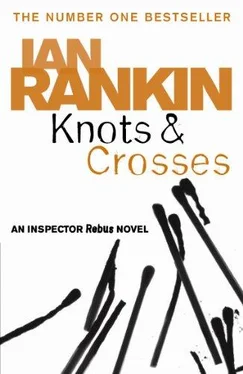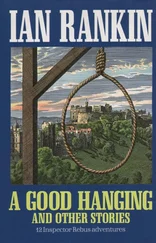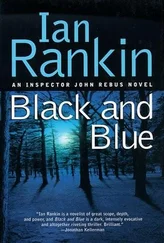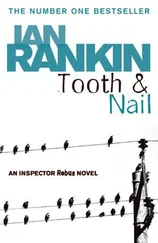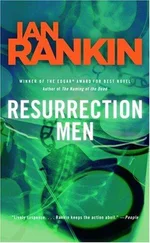‘A real dark night of the soul,’ he said, beginning to shake. ‘It’s cold in here. The pilot-light must have blown out.’
Gill blew her nose and folded her arms.
‘No, it’s warm enough in here, John. Listen,’ she spoke slowly, deferentially, ‘we need a physical description of this man. I know that it will have to be a fifteen-year-old description, but it’ll be a start. Then we need to check up on what happened to him after you des … after you left him.’
‘That will be classified, if it exists at all.’
‘And we need to tell the Chief about all of this.’ Gill went on as if Rebus had said nothing. Her eyes were fixed in front of her. ‘We need to find that creep.’
The room seemed very quiet to Rebus, as though a death had occurred, when really it had been a birth of sorts, the birth of his memory. Of Gordon. Of walking out of that cold, merciless cell. Of turning his back …
‘Can you be sure that this Reeve character is your man?’ Michael was pouring more whisky. Rebus shook his head at the proffered glass.
‘Not for me thanks. My head feels all fuzzy. Oh yes, I think we can be pretty certain who’s behind it. The messages, the knots and the crosses. It all makes sense now. It’s been making sense all along. Reeve must think I’m really thick. He’s been sending me clear messages for weeks, and I’ve failed to realise … I’ve let those girls die … All because I couldn’t face the facts … the facts …’
Gill bent down behind him and put her hands on his shoulders. John Rebus shot out of his chair and turned to her. Reeve. No, Gill, Gill. He shook his head in mute apology. Then burst into tears.
Gill looked towards Michael, but Michael had lowered his eyes. She hugged Rebus hard, not allowing him to break away from her again, all the time whispering that it was she, Gill, beside him, and not any ghost from the past. Michael was wondering what he had got himself into. He had never seen John cry before. Again, the guilt flooded him. He would stop it all. He didn’t need it any more. He would lie low and just let his dealer get tired of looking for him, let his clients find new people. He would do it, not for John’s sake but for his own.
We treated him like shit, he thought to himself, it’s true. The old man and me treated him as though he were an intruder.
Later, over coffee, Rebus seemed calm, though Gill’s eyes were still on him, wondering, fearing.
‘We can be sure that this Reeve is off his chump,’ she said.
‘Perhaps,’ said Rebus. ‘One thing is for sure, he’ll be armed. He’ll be ready for anything. The man was a Seaforths regular and a member of the SAS. He’ll be hard as nails.’
‘You were too, John.’
‘That’s why I’m the man to track him down. The Chief must be made to understand that, Gill. I’m back on the case.’
Gill pursed her lips.
‘I’m not sure he’ll go for that,’ she said.
‘Well, sod him then. I’ll find the bastard anyway.’
‘You do that, John,’ said Michael. ‘You do that. Don’t care what any of them say.’
‘Mickey,’ said Rebus, ‘you are absolutely the best brother I could have had. Now, is there any food on the go? I’m starved.’
‘And I’m whacked,’ said Michael, feeling pleased with himself. ‘Do you mind if I lie down for an hour or two here before I drive back?’
‘Not at all, go through to my room, Mickey.’
‘Goodnight, Michael,’ said Gill.
He was smiling as he left them.
Knots and crosses. Noughts and crosses. It was so blatant, really. Reeve must have taken him for a fool, and in a way he had been right. Those endless games they had played, all those tricks and manoeuvres, and their talk about Christianity, those reef knots and Gordian knots. And The Cross. God, how stupid he had been, allowing his memory into tricking him that the past was a cracked and useless vessel, emptying its spirit. How stupid.
‘John, you’re spilling your coffee.’
Gill was bringing in a plateful of cheese on toast from the kitchen. Rebus roused himself awake.
‘Eat this. I’ve been on to HQ We’ve to be there in two hours’ time. They’ve already started running a check on Reeve’s name. We should find him.’
‘I hope so, Gill. Oh God, I hope so.’
They hugged. She suggested that they lie on the couch. They did so, tight in a warming embrace. Rebus couldn’t help wondering whether his dark night had been an exorcism of sorts, whether the past would still haunt him sexually. He hoped not. Certainly, it was neither the time nor the place to try it out.
Gordon, my friend, what did I do to you?
Stevens was a patient man. The two policemen had been firm with him. No one could see Detective Sergeant Rebus for the moment. Stevens had returned to the newspaper office, worked on a report for the paper’s three-a.m. print-run, and then had driven back to Rebus’s flat. There were still lights on up there, but also there were two new gorillas by the door of the tenement. Stevens parked across the street and lit another cigarette. It was tying together nicely. The two threads were becoming one. The murders and the drug-pushing were involved in some way, and Rebus was the key by the look of things. What were his brother and he talking about at this hour? A contingency plan perhaps. God, he would have given anything to be a fly on the living-room wall just now. Anything. He knew reporters in Fleet Street who went in for sophisticated surveillance techniques — bugs, high-powered microphones, telephone-taps — and he wondered if it might not be worthwhile to invest in some of that equipment himself.
He formulated new theories in his head, theories with hundreds of permutations. If Edinburgh’s drug-racketeers had gone into the abduction-and-murder business to put the frights on some poor bastards, then things were taking a very grim turn indeed, and he, Jim Stevens, would have to be even more careful in future. Yet Big Podeen had known nothing. Say, then, that a new gang had broken into the game, bringing with it new rules. That would make for a gang-war, Glasgow-style. But things, surely, were not done that way today. Maybe.
In this way, Stevens kept himself awake and alert, scribbling his thoughts into a notebook. His radio was on, and he listened to the half-hourly news reports. A policeman’s daughter was the new victim of Edinburgh’s child-murderer. In the most recent abduction, a man was killed, strangled in the house of the child’s mother. And so on. Stevens went on formulating, went on speculating.
It had not yet been revealed that all the murders were linked to Rebus. The police were not about to make that public, not even to Jim Stevens.
At seven-thirty, Stevens managed to bribe a passing newspaper-boy into bringing him rolls and milk from a nearby shop. He washed the dry, powdery rolls down with the icy milk. The heating was on in his car, but he felt chilled to the marrow. He needed a shower, a shave, and some sleep. Not necessarily in that order. But he was too close to let this go now. He had the tenacity — some would call it madness, fanaticism — of every good reporter. He had watched other hacks arriving in the night and being sent away again. One or two had seen him sitting in his car and had come across for a chat and to sniff out any leads. He had. hidden away his notebook then, feigning disinterest, telling them that he would be going home shortly. Lies, damned lies.
That was part of the business.
And now, finally, they were emerging from the building. A few cameras and microphones were there, of course, but nothing too tasteless, no pushing and shoving and harassing. For one thing, this was a grieving father; for another, he was a policeman. Nobody was about to harass him.
Читать дальше
